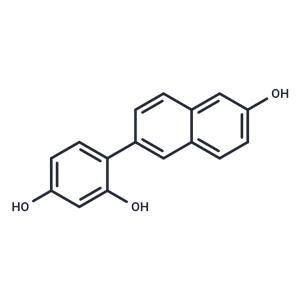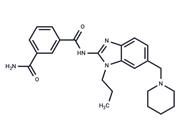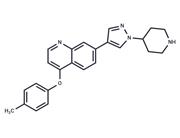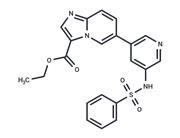| Name | HS-1793 |
| Description | HS-1793, a resveratrol analogue, downregulates the expression of hypoxia-induced HIF-1 and VEGF and inhibits tumor growth of human breast cancer cells in a nude mouse xenograft model |
| In vitro | HS-1793 was found to inhibit hypoxia (1.0% oxygen)-induced HIF-1α expression at the protein level, and its inhibitory effect was more potent than that of resveratrol in MCF-7 and MDA-MB-231 breast cancer cells.?Furthermore, HS-1793 reduced the secretion and mRNA expression of vascular endothelial growth factor (VEGF), a key mediator of HIF-1-driven angiogenesis, without affecting cell viability. |
| In vivo | HS-1793 significantly suppressed the growth of breast cancer tumor xenografts, without any apparent toxicity.?Additionally, decreases in Ki-67, a proliferation index marker, and CD31, a biomarker of microvessel density, were observed in the tumor tissue.?Expression of HIF-1 and VEGF was also downregulated in xenograft tumors treated with HS-1793.?These in vivo results reinforce the improved anticancer activity of HS-1793 when compared with that of resveratrol.?Overall, the present study suggests that the synthetic resveratrol analogue HS-1793 is a potent antitumor agent that inhibits tumor growth via the regulation of HIF-1, and demonstrates significant therapeutic potential for solid cancers. |
| Storage | Powder: -20°C for 3 years | In solvent: -80°C for 1 year | Shipping with blue ice. |
| Solubility Information | DMSO : 22.5 mg/mL (89.19 mM)
|
| Keywords | HIF-1α | Inhibitor | MCF-7 | breast cancer | inhibit | ERK | HS1793 | HCT116 | resveratrol | VEGF | Apoptosis | Akt | HS-1793 | colon cancer | HS 1793 |
| Related Compound Libraries | Bioactive Compound Library | HIF-1 Signaling Pathway Compound Library | NO PAINS Compound Library | Bioactive Compounds Library Max | Anti-Cancer Compound Library | Anti-Cancer Active Compound Library |

 United States
United States



